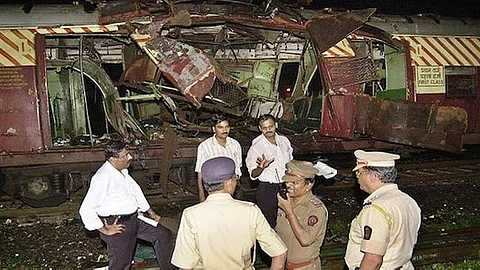
- Home
- न्यूजग्राम
- NewsGram USA
- India
- World
- Politics
- Entertainment
- Culture
- Lifestyle
- Economy
- Sports
- Sp. Coverage
- Misc.
- NewsGram Exclusive
- Jobs / Internships

Bombay High Court Acquits All 12 Accused from 2006 Mumbai train blast
Court Cites Lack of Evidence and Unreliable Testimonies
The prosecution utterly failed to prove the charges
The 12 individuals who were accused in the 7/11 Mumbai train blasts case have been acquitted on 21 July, 2025. Nineteen years after the devastating 2006 Mumbai train bombings that killed 189 people and injured over 800, the Bombay High Court ruled that the prosecution had utterly failed to prove the charges against them, leading to their release.
The blasts took place on July 11, 2006, when seven bombs exploded within just 11 minutes during the evening rush hour. The attackers had used pressure cookers as bombs to cause maximum damage. The explosions targeted first-class compartments on Mumbai’s local trains and occurred between 6:24 pm and 6:35 pm at various stations on the Western Railway line — Matunga Road, Mahim Junction, Bandra, Khar Road, Jogeshwari, Bhayandar, and Borivali.
In 2015, a special Maharashtra Control of Organised Crime Act (MCOCA) court convicted 12 people in the case. Five of them — Faisal Sheikh, Asif Khan, Kamal Ansari, Ehtesham Siddiqui, and Naveed Khan — were sentenced to death. The remaining seven — Mohammed Sajid Ansari, Mohammed Ali, Dr. Tanveer Ansari, Majid Shafi, Muzzammil Shaikh, Sohail Shaikh, and Zamir Shaikh — were sentenced to life imprisonment as they were part of the conspiracy.
However, on July 21, 2025, a double bench of the Bombay High Court comprising Justices Anil Kilor and Shyam Chandak overturned the verdict. The bench ruled that the prosecution’s evidence was inconclusive and unreliable, and the case lacked credible proof linking the accused to the bombings.
“The prosecution has utterly failed to prove the case against the accused. It is hard to believe that the accused committed the crime. Hence, their conviction is quashed and set aside,” the court said. The High Court also observed that the evidence produced, including explosives, arms, and maps, appeared unrelated to the blasts. It further pointed out that the type of bombs used was not even proven by investigators.
The judges also expressed doubts about the reliability of witness testimonies, noting that expecting a person to remember details about a suspect 100 days after the incident was unrealistic. The court added that the accused should be released immediately if they are not involved in any other pending cases.
The acquittal of all 12 men has raised questions about the handling of one of the most significant terror investigations in India’s history. It also underscores serious concerns about the quality of evidence gathering, prosecution conduct, and the long delay in achieving judicial closure.
The verdict, though a major development, leaves unanswered questions about who was truly behind the deadly 7/11 train blasts that brought Mumbai to a standstill in 2006. [Rh/Eth/VP]
